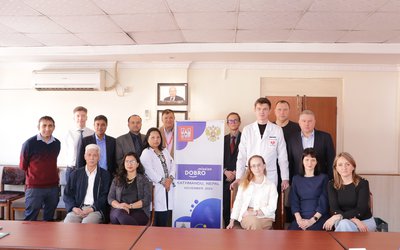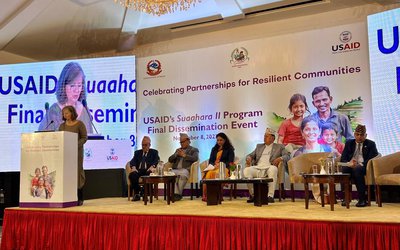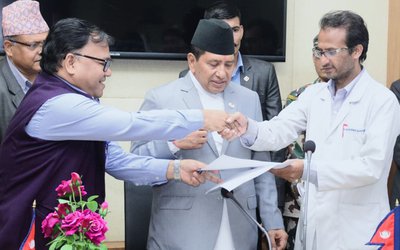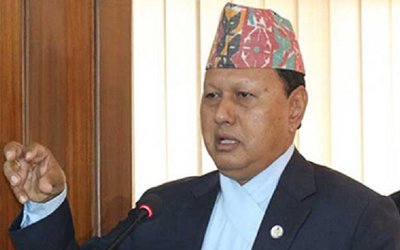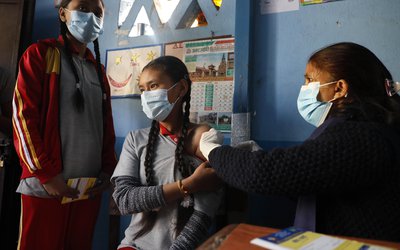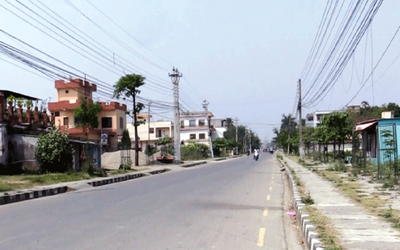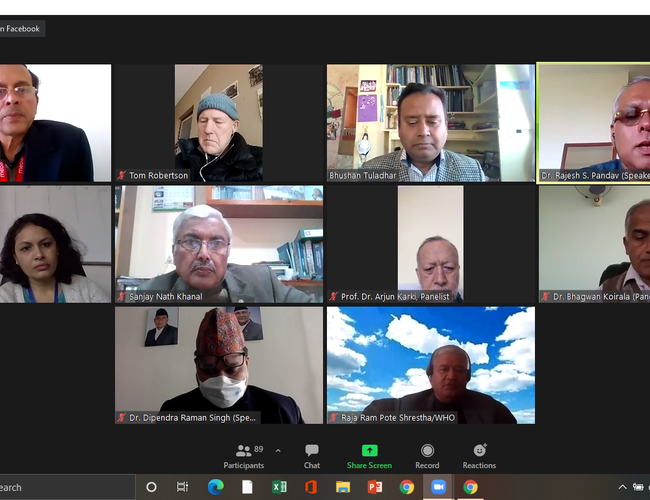
Dr. Rajesh S. Pandav, WHO Nepal representative, said that 9 out of 10 people breathe polluted air worldwide and 7 million people die every year due to air pollution.
Delivering a statement, Dr. Pandav also reflected that COVID-19 is linked to air pollution as it is also a respiratory disease, so people exposed to poor air quality are more susceptible to COVID-19. Accordingly, the health sector has specific responsibility to inform policy-makers and the public on the health impacts of climate and environmental change.
He mentioned that this policy dialogue under the Urban Health Initiative (UHI) pilot program is extremely important to deliberate upon appropriate solutions and advocate measures to mitigate air pollution.
Jointly organized by Ministry of Health and Population (MoHP), Department of Environment (DoEnv), World Health Organization (WHO), and Clean Energy Nepal (CEN), various speakers talked different aspects in a zoom platform in Science-Policy Dialogue on Health Impacts of Air Pollution in Kathmandu Valley.
The main objective of this dialogue was to discuss the health impacts of air pollution among the stakeholders and measures required to address the problem of air pollution in the Kathmandu Valley.
The dialogue was organized under the Urban Health Initiative (UHI) as a knowledge-sharing event with support from WHO. The dialogue was focused on various aspects of health impacts of air pollution from the viewpoint of experienced health professionals and policy makers. Around 110 participants joined the program including the senior officials from MoHP, DoEnv, WHO, medical doctors, academicians and journalists through Zoom and Facebook live.
The program was moderated by Mr. Bhushan Tuladhar, the Board Chair of CEN. On the dialogue, Prof. Jageshwor Gautam, Chief of Health Coordination Division and spokesperson from MoHP delivered welcome remarks where he talked about the sources of air pollution, degrading air quality of the valley during winter, health impacts of air pollution, and the commitment of MoHP to address these health impacts caused by air pollution.
Dr. Gautam highlighted that children, road-side workers, women and elderly people are the most vulnerable groups linked to air pollution. Prof. Sanjay Nath Khanal, a consultant from CEN delivered a technical presentation with overview of air pollution and shared the findings of WHO/KU study in terms of averted deaths and life-year gains with the improvement in air quality based on policy interventions.
Dr. Arvind Kumar, founder of Lungs Care Foundation and Doctors for Clean Air from India delivered a keynote presentation where he shared his 30+ years’ experience as a chest surgeon. He showed the comparative picture taken during the surgery of pink lungs (healthy) and black lungs (diseased) to highlight the adverse effects of air pollution. Dr. Kumar stated that there are no non-smokers in India, on average exposure to air pollution leads to damage equivalent to smoking 5-6 cigarettes per day also among new-born.
He highlighted some of the initiatives taken on his leadership to address air pollution in India such as empowering school children, conducting awareness, advocacy, disseminating information, education and communication materials. Dr. Kumar also concluded that doctors are motivators to raise voice against air pollution.
Dr. Dipendra Raman Singh, Director General from the Department of Health Services delivered closing remarks emphasizing that this program is good initiation at right time because it is the time for the government to look for programs and action plans for coming year. He highlighted on three principles of Sustainable Development Goals that were universality, integration and transformation and therefore these need actions at all the three levels of the government to address environmental issue. In panel discussion, there were six prominent panelists in the program.
Prof. Dr. Arjun Karki, Pulmonologist and Critical Care Specialist said that we have policies, recommendations but lacks effective implementation, therefore we need to the buildup task force, alliance with academicians, professionals, activists and journalists to monitor the situation and update by science and shreds of evidence to observe the effective outcome of written policies and recommendations.
Prof. Dr. Bhagawan Koirala, Chairman of Nepal Medical Council and Cardiologist at Tribhuvan University Teaching Hospital highlighted that we need to generate voice against air pollution and enforce the existing policies. Dr. Koirala said that 40% of respiratory disorder deaths and 25% of cardiovascular deaths in Nepal are caused by air pollution. Therefore our continuous effort is required to tackle air pollution such as community awareness, advocacy, promotion of e-vehicles, and promotion of cleaner energy. “There is no reason that our children should live in polluted air,” he said.
Dr. Sangeeta Kaushal Mishra, Director of Maternity and Women’s Hospital urged that women should be centered when talking about the health impacts of air pollution as they are at more exposed and double the risk. This risk affects their reproductive health because as per certain data preterm delivery is 18% and low birth weight is 14% in Nepal, this findings means that all these babies need ICU and extra care burdening the economic factors. She emphasized that the new studies have shown that a high level of pollution can affect the formation of eggs and even the sperms as well causing chances of infertility.
Dr. Mishra added that there is the tendency to burn tyres to protest which can emit toxins causing a probability of breast cancer among women. Likewise, Dr. Roshan Pokharel, Chief Specialist of the Ministry of Health and Population acknowledges that the implementation part is poor from authorization and other stakeholders, and the ministry is concerned about environmental pollution. He added that a multi-sectoral approach is necessary to address the air pollution issue and promote the Public-Private Partnership model to move forward. He was worried about public awareness and their roles and responsibility to fulfil social ethics. He looked forward to working with the stakeholders to solve the air pollution issue.
Prof. Dr. Sunil Kumar Joshi, Head of Department of Community Health from KMC shared his research done earlier on indoor air pollution, occupational health and ambient air pollution. He highlighted that air pollution is an important issue so we need to sensitize policy-makers and young researchers to work on controlling air pollution. Dr. Joshi said that enforcing existing policies and making necessary new policies is a requirement to control air pollution
- Nepal Army Held National Cyber Security Symposium
- Apr 26, 2024
- Nepal’s Investment Landscape Revitalize By Nine Ordinances: FNCCI President Dhakal
- Apr 26, 2024
- Weather Forecast: Partly Cloudy In Hilly region And Mainly Fair In Plain Areas
- Apr 26, 2024
- Nepal-China Aid Project Meeting Held In Lhasa
- Apr 25, 2024
- Ambassador Subedi Presented The Letter Of Credence To President Of Italy
- Apr 25, 2024


